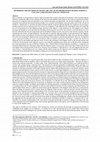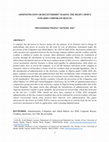Papers by Oluwatumininu Omotoye

Oluwatumininu Omotoye, 2023
Once a company is incorporated, it enjoys a legal personality that is distinct from that of its m... more Once a company is incorporated, it enjoys a legal personality that is distinct from that of its members. This invariably implies that those running the affairs of the company do not incur personal liability while doing so. The cloak of corporate personality bestowed on companies upon incorporation is one of the antecedents of registration. The doctrine of lifting the veil is an exception to the general rule of corporate personality. It is a creation of the English courts and came to fore in the old case of Salomon v. Salomon & Co. Ltd where the House of lords held the corporate legal personality of a company to be sacrosanct and the corporate veil not easily pierced. Prior to the case of Adams v. Cape Industries Plc, the English courts will readily lift the veil of incorporation at the slightest prompt. However, from Adams v. Cape Industries Plc, the English courts started devising well thought out rules that allow for the lifting of the corporate veil. In the case of Prest v. Petrodel Resources Ltd it became settled that the veil of incorporation will not be lifted for flimsy reasons, even if it is in the interest of justice, but for impropriety and evasion of legal obligation. The principle of corporate legal personality is well entrenched in the Nigerian legal system as same is provided for in section 42 of the Companies and Allied Matters Act 2020. Also, the doctrine of lifting the veil is well recognised in Nigeria as the courts will lift the veil in instances stated by the Legislature. However, the Nigerian courts’ approach in lifting the veil is not streamlined, unlike its English counterparts. This paper examines the doctrine of lifting the veil by the English and Nigerian courts. It traces the movement in the English courts to the present position and reveals the inconsistencies of the Nigerian courts in exercising the equitable power of the court to lift the veil by considering few cases particularly the case of Mariner Nominee Ltd v. Federal Board of Inland Revenue and Mezu v. Cooperative & Commerce Bank (Nig.) Ltd. This paper argues that the Nigerian courts, in most cases, fail to avert their minds to the trend in the English courts and the position in the locus classicus case of Salomon v. Salomon & Co. Ltd, and suggests that the clear rule in Prest v. Petrodel Resources Ltd or better still the earlier position by the Nigerian court in Mariner Nominee Ltd v. Federal Board of Inland Revenue be adopted in lifting the veil of incorporation in Nigeria.
Keywords: Companies and Allied matters Act 2020, Corporate Personality, English and Nigerian Courts, Lifting the Veil.

UNIVERSITY OF IBADAN LAW JOURNAL, 2022
A company has the power to borrow money for the purpose of its business and to charge its underta... more A company has the power to borrow money for the purpose of its business and to charge its undertakings and assets as security for the loan by way of debenture instrument under the provisions of the Companies and Allied Matters Act 2020 (CAMA 2020). Such money advanced is with a promise for repayment between the borrowing company (debtor) and the creditor, and the creditor is entitled to realise his security. Most debenture makes provision for realisation of security through the mechanism of receivership and administration. While receivership is an enforcement mechanism and one of the most common means of debt recovery; administration is a rescue mechanism whereby business is being held together by administration while plans are formed either, first, to rescue the company; or to sell the business and assets of the company in situations where it will produce a better result for creditors than an outright liquidation. Due to the introduction of administration to the insolvency regime in Nigeria under CAMA 2020, this paper examines receivership and administration and their mechanisms while considering which of these mechanisms facilitate the objective of corporate rescue while taking care of the interest of all stakeholders. This paper further examines critically the provisions of the Companies and Allied Matters Act 2020 and United Kingdom's Insolvency Act of 1986 on administration from a comparative perspective due to the insolvency regime in Nigeria being modelled after that of the United Kingdom. The paper posits that although the introduction of administration into the Nigerian insolvency regime is quite laudable; the provision on receivership, which has been part of the old Act-CAMA 1990, should not have been retained in CAMA 2020 alongside administration as this has created a loophole that can be exploited by secured creditors who may choose receivership which solely protects their interests, over administration. This paper advocates for the review of CAMA 2020 to remove receivership in its entirety from the law as an insolvency mechanism or limit its application, while retaining administration.










Uploads
Papers by Oluwatumininu Omotoye
Keywords: Companies and Allied matters Act 2020, Corporate Personality, English and Nigerian Courts, Lifting the Veil.
Keywords: Companies and Allied matters Act 2020, Corporate Personality, English and Nigerian Courts, Lifting the Veil.